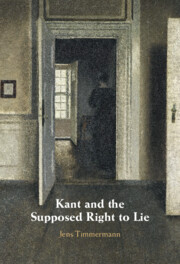Refine search
Actions for selected content:
58 results
Not Every Deliberately Willed Spoken Falsehood Is a Lie: Formulating a Polyvalent Thomistic Theory of Speech Acts
-
- Journal:
- New Blackfriars ,
- Published online by Cambridge University Press:
- 10 December 2025, pp. 1-17
-
- Article
-
- You have access
- Open access
- HTML
- Export citation
Why Demagogues Lie Big
-
- Journal:
- Episteme , First View
- Published online by Cambridge University Press:
- 25 September 2025, pp. 1-22
-
- Article
-
- You have access
- Open access
- HTML
- Export citation
Preface
-
- Book:
- Kant and the Supposed Right to Lie
- Published online:
- 18 July 2025
- Print publication:
- 28 August 2025, pp xi-xvii
-
- Chapter
- Export citation
Chapter VII - Form and Matter
-
- Book:
- Kant and the Supposed Right to Lie
- Published online:
- 18 July 2025
- Print publication:
- 28 August 2025, pp 107-129
-
- Chapter
- Export citation
Chapter V - The Intricacies of Constant’s Example
-
- Book:
- Kant and the Supposed Right to Lie
- Published online:
- 18 July 2025
- Print publication:
- 28 August 2025, pp 77-97
-
- Chapter
- Export citation
Chapter VI - A Right to the Truth in Another?
-
- Book:
- Kant and the Supposed Right to Lie
- Published online:
- 18 July 2025
- Print publication:
- 28 August 2025, pp 98-106
-
- Chapter
- Export citation
Are mandatory oaths effective in groups?
-
- Journal:
- Experimental Economics / Volume 28 / Issue 2 / March 2025
- Published online by Cambridge University Press:
- 21 July 2025, pp. 317-333
-
- Article
-
- You have access
- Open access
- HTML
- Export citation

Kant and the Supposed Right to Lie
-
- Published online:
- 18 July 2025
- Print publication:
- 28 August 2025
Saliency, honesty and competition
-
- Journal:
- Behavioural Public Policy , First View
- Published online by Cambridge University Press:
- 03 July 2025, pp. 1-23
-
- Article
-
- You have access
- Open access
- HTML
- Export citation
On the Ethics of Lying
-
- Journal:
- New Blackfriars / Volume 106 / Issue 5 / September 2025
- Published online by Cambridge University Press:
- 22 May 2025, pp. 373-397
- Print publication:
- September 2025
-
- Article
-
- You have access
- Open access
- HTML
- Export citation
Chapter 3 - The Scriblerian Mock Arts
-
- Book:
- Satire, Instruction and Useful Knowledge in Eighteenth-Century Britain
- Published online:
- 24 April 2025
- Print publication:
- 08 May 2025, pp 51-83
-
- Chapter
-
- You have access
- Open access
- Export citation
Verbal feedback modulates language choice and risk-taking in Chinese-English bilinguals
-
- Journal:
- Bilingualism: Language and Cognition , First View
- Published online by Cambridge University Press:
- 27 March 2025, pp. 1-12
-
- Article
-
- You have access
- Open access
- HTML
- Export citation
Who never tells a lie?
-
- Journal:
- Experimental Economics / Volume 20 / Issue 2 / June 2017
- Published online by Cambridge University Press:
- 14 March 2025, pp. 448-459
-
- Article
- Export citation
Cheating, incentives, and money manipulation
-
- Journal:
- Experimental Economics / Volume 22 / Issue 1 / 15 March 2019
- Published online by Cambridge University Press:
- 14 March 2025, pp. 155-177
-
- Article
- Export citation
The interaction between competition and unethical behaviour
-
- Journal:
- Experimental Economics / Volume 22 / Issue 1 / 15 March 2019
- Published online by Cambridge University Press:
- 14 March 2025, pp. 101-130
-
- Article
- Export citation
Would I lie to you? On social preferences and lying aversion
-
- Journal:
- Experimental Economics / Volume 12 / Issue 2 / June 2009
- Published online by Cambridge University Press:
- 14 March 2025, pp. 180-192
-
- Article
- Export citation
Afterword
- from Part V - Civil Society and Tackling Disinformation
-
-
- Book:
- Disinformation, Misinformation, and Democracy
- Published online:
- 09 January 2025
- Print publication:
- 23 January 2025, pp 399-414
-
- Chapter
-
- You have access
- Open access
- HTML
- Export citation
A method to estimate mean lying rates and their full distribution
-
- Journal:
- Journal of the Economic Science Association / Volume 4 / Issue 2 / December 2018
- Published online by Cambridge University Press:
- 17 January 2025, pp. 136-150
-
- Article
- Export citation
Lying in two dimensions
-
- Journal:
- Journal of the Economic Science Association / Volume 9 / Issue 1 / June 2023
- Published online by Cambridge University Press:
- 17 January 2025, pp. 34-50
-
- Article
- Export citation
Show no quarter: combating plausible lies with ex-ante honesty oaths
-
- Journal:
- Journal of the Economic Science Association / Volume 9 / Issue 1 / June 2023
- Published online by Cambridge University Press:
- 17 January 2025, pp. 66-76
-
- Article
- Export citation
